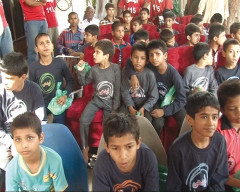
Mental health disorders such as depression, anxiety and attention deficit/hyperactive disorder are more frequently discussed today. Yet, when it comes to autism, most people have no clue about what the condition entails. In fact, not just public but even healthcare practitioners are highly unaware of autism. A survey conducted in 2011 in Karachi, reported in the Journal of Autism and Developmental Disorders, found that out of 348 general physicians only 148 (44.6%) had previously heard of autism.
Autism isn’t a single disorder but a complex group of conditions, varying in degree and symptoms. The most recent diagnostic manual, DSM-5, has combined these conditions under Autism Spectrum Disorders (ASD). It is generally associated with communication difficulties, repetitive behaviours and limited interests. These symptoms are more identifiable starting between two to three years of age. The disability ranges from mild to severe, but treatment can positively affect their abilities.
World Autism Day : Autism is a misunderstood, misdiagnosed disease
Autism in Pakistan
According to Autism Resource Centre, 345,600 people are estimated to be living with autism in the country. However, the condition is thought to be severely underreported as a lack of diagnostic capability and general dearth of experts, increase the chances of misdiagnosis. Hence the actual figure is thought to be considerably high.
Autistic individuals, both children and adults may have mild to severe disability. Early intervention and treatment have been proven to reduce these difficulties but such services are almost absent in Pakistan. Even in high-functioning individuals, problems such as irritability and hyperactivity may make it difficult to score a job. This leaves almost 350,000 people, unarmed with basic skills to take up regular employment and manoeuvre the workplace.
In an absence of social security and the ability to meet basic needs of people with disability, the parents of autistic children are bound to lead a burdensome life. “I live in fear thinking what if my child stops speaking at all… I only want to see my kid leading a normal life like everyone else,” says Samina Azhar*, mother of four-year-old Hamza* diagnosed with ASD. She’s hopeful one day the society will be able to understand why her child doesn’t want to communicate with every outsider.
“Children with a speech delay are more likely to go through behavioural and emotional problems. So they’re bound to have a more difficult time,” says Maliha Nabeel*, whose five-year-old son was diagnosed with autism, leading to difficulty in communication. “It’s depressing to see your child unable to communicate and form bonds with others. It can be difficult for [even] us to interact with him as well,” she adds.
Working with autism
When it comes to ASD, most people are quick to group it as a mental inability and this is where we are wrong. Many of these ‘symptoms’ can be true assets in the workplace. In fact, the German software company, SAP AG has been employing individuals on the spectrum for a variety of jobs. The condition helps people with autism pay a lot of attention to details, a highly useful trait for the company’s software testing. Other jobs such as manual preparation and business procurement activities also utilise this skill set.
Improving education quality: Professional development training kicks off at FJWU
Yet, even in most developed countries, the unemployment rate for people with ASD can be as high as 85%. But it’s not the lack of ability that is the cause of unemployment. On one hand autistic individuals face difficulty in communication and social interactions, while on the other, we are unable to see past these differences. Both these issues prevent autistic people from getting and keeping a job.
Strategies to solve workplace problems
Just as every other person, individuals with autism should be trained from a young age. Saman Zafar, a Child Psychologist at IMPACT by Psyche' Consultants, explains how their organisation follows a multidimensional approach. “We have a team of specialists including speech therapists, occupational therapists, clinical psychologists and play therapists. We focus on different areas of development like interaction and communication. Our focus is to train these children as well as their parents,” informs Zafar.
Qazi Fazli Azeem, the first self-advocate from Pakistan, also believes early intervention works better. In presentations delivered to 2009 South Asian Regional Autism Conference (Dhaka, Bangladesh) and United Nations World Autism Awareness Day 2013 (New York, United States), he presented his ideas for incorporating this training. He opined parents and mentors should provide these children exposure earlier in life so they can develop their skills based on their interests. He further added those individuals, who don’t have a verbal disability or are better at communication, should be taught basics about life in a visual structured manner. For example, better work equals greater pay, and not just one time, this should be done repetitively. Give them tasks and reward success through toys or food or an intangible form of ‘payment’, such as encouragement.
Another important part of training is to prepare them for the office environment. Azeem reflects on his experiences with various institutions, which provide a professional environment and mentors as they would come across in an office environment. However, he points out difficulty to communicate can make it harder for these individuals. Adjustments at the workplace can be made by using a messaging service, an email system through which they’re contacted or visual or tactile cues instead of directly talking to them, based on their communication preferences. Azeem has supported and advised several institutions such as Ma Ayesha Centre, Karachi Vocational Training Centre for the Intellectually Challenged and Network of Organizations Working with People with Disabilities, Pakistan in working with people on the autism spectrum.
Other organisations have come up with other solutions; one of them being virtual reality. Virtual interviewers are helping young people train for interviews. Dan Marino Foundation in Florida, US, has seen a rise in employment rates of autistic students after being trained through virtual avatars. We also need to make the work environment friendlier for them. There is a dire need to train staff to help them see autistic individuals as more than people with a disability. In fact, these behaviours are usually what disturb the autistic individuals.
They also need scheduling and perhaps regular feedbacks because of their tendency to keep things in order. Provide clear instructions without any use of metaphors or any unsaid directives. They tend to communicate better in writing rather than verbally. In order to judge their abilities, you can substitute usual interview questions with a written test. Try to manage a routine and avoid interruptions while they’re at work. A surprise birthday celebration isn’t their idea of a good time, mostly because it isn’t scheduled. Just let them know beforehand if any rescheduling is in order.
Agreement signed: AIOU to promote skill-based education
A hope for tomorrow
Although there are a few organisations working with autistic individuals in Pakistan, such as Autism Society Pakistan, these are not enough for the ever increasing number of people on the spectrum. Their integration needs individual efforts. Own a business? Train and hire autistic individuals. Whether you’re a store owner or a tech entrepreneur, you can teach them a skill or two. Help them navigate the work environment. This isn’t philanthropy; you will be getting much more in return as autistic individuals can be highly accurate in their tasks.
It is very clear our country’s future depends on our youth. Involving more people with learning or other disabilities in the workforce can only benefit our nation. However, this requires initiative on the government level. “Awareness about autism, training of paediatricians for correct assessment and early intervention are the three steps through which we can make real progress,” concludes Zafar.
*Names have been changed to protect privacy
Kanwal Tariq is a bio-technologist, a writer and a feminist.




















































COMMENTS
Comments are moderated and generally will be posted if they are on-topic and not abusive.
For more information, please see our Comments FAQ